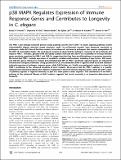| dc.contributor.author | Troemel, Emily R | |
| dc.contributor.author | Chu, Stephanie W | |
| dc.contributor.author | Reinke, Valerie | |
| dc.contributor.author | Lee, Siu Sylvia | |
| dc.contributor.author | Ausubel, Frederick M. | |
| dc.contributor.author | Kim, Dennis H | |
| dc.date.accessioned | 2010-11-01T17:48:45Z | |
| dc.date.issued | 2006 | |
| dc.identifier.citation | Troemel, Emily R., Stephanie W. Chu, Valerie Reinke, Siu Sylvia Lee, Frederick M. Ausubel, Dennis H. Kim. 2006. p38 MAPK Regulates Expression of Immune Response Genes and Contributes to Longevity in C. elegans. PLoS Genetics 2:e183. | en_US |
| dc.identifier.issn | 1553-7390 | en_US |
| dc.identifier.uri | http://nrs.harvard.edu/urn-3:HUL.InstRepos:4515095 | |
| dc.description.abstract | The PMK-1 p38 mitogen-activated protein kinase pathway and the DAF-2–DAF-16 insulin signaling pathway control Caenorhabditis elegans intestinal innate immunity. pmk-1 loss-of-function mutants have enhanced sensitivity to pathogens, while daf-2 loss-of-function mutants have enhanced resistance to pathogens that requires upregulation of the DAF-16 transcription factor. We used genetic analysis to show that the pathogen resistance of daf-2 mutants also requires PMK-1. However, genome-wide microarray analysis indicated that there was essentially no overlap between genes positively regulated by PMK-1 and DAF-16, suggesting that they form parallel pathways to promote immunity. We found that PMK-1 controls expression of candidate secreted antimicrobials, including C-type lectins, ShK toxins, and CUB-like genes. Microarray analysis demonstrated that 25% of PMK-1 positively regulated genes are induced by Pseudomonas aeruginosa infection. Using quantitative PCR, we showed that PMK-1 regulates both basal and infection-induced expression of pathogen response genes, while DAF-16 does not. Finally, we used genetic analysis to show that PMK-1 contributes to the enhanced longevity of daf-2 mutants. We propose that the PMK-1 pathway is a specific, indispensable immunity pathway that mediates expression of secreted immune response genes, while the DAF-2–DAF-16 pathway appears to regulate immunity as part of a more general stress response. The contribution of the PMK-1 pathway to the enhanced lifespan of daf-2 mutants suggests that innate immunity is an important determinant of longevity. | en_US |
| dc.description.sponsorship | Molecular and Cellular Biology | en_US |
| dc.language.iso | en_US | en_US |
| dc.publisher | Public Library of Science | en_US |
| dc.relation.isversionof | doi:10.1371/journal.pgen.0020183 | en_US |
| dc.relation.hasversion | http://www.ncbi.nlm.nih.gov/pmc/articles/PMC1635533/pdf/ | en_US |
| dash.license | LAA | |
| dc.subject | immunology | en_US |
| dc.subject | infectious diseases | en_US |
| dc.subject | genetics | en_US |
| dc.subject | functional genomics | en_US |
| dc.subject | disease models | en_US |
| dc.subject | gene expression | en_US |
| dc.subject | nematodes | en_US |
| dc.subject | eubacteria | en_US |
| dc.title | p38 MAPK Regulates Expression of Immune Response Genes and Contributes to Longevity in C. elegans | en_US |
| dc.type | Journal Article | en_US |
| dc.description.version | Version of Record | en_US |
| dc.relation.journal | PLoS Genetics | en_US |
| dash.depositing.author | Ausubel, Frederick M. | |
| dc.date.available | 2010-11-01T17:48:45Z | |
| dc.identifier.doi | 10.1371/journal.pgen.0020183 | * |
| dash.contributor.affiliated | Ausubel, Frederick | |


